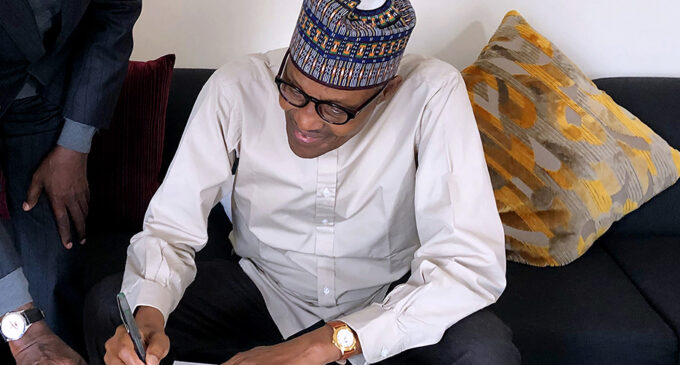EXPLAINER: What’s the big deal about this ‘$1.4bn PSC law’ just signed by Buhari?

There has been so much noise about the amendment of PSCs in the deep offshore and inland basin production sharing contract (DOIBPSC) law which President Muhammadu Buhari signed on Monday. What’s PSC, for goodness sake?
In the late 1980s and early 1990s, oil prices were very low and Nigeria was struggling to meet its cash-call obligations to the joint ventures (JVs) with oil majors. The country was also keen on expanding its oil reserves. To achieve these multiple goals, the country turned to an oil production/contractual arrangement called the production sharing contract (PSC), pioneered by Indonesia in 1967. Under the arrangement, the country as the sole owner of the oil engages contractors (Shell and co.) to provide technical and financial services for exploration and production.
Really? How does that benefit Nigeria?
When oil is found, the contractor pays rent (royalty) on the right to extract, recoups its expenditure/costs, takes a major chunk of the profits over the life of the project and pays taxes due on its profits. The oil produced under PSCs is shared thus: royalty first (which goes to government), then the cost (which goes to the contractors), then profit (shared by the government and the contractors, but more to the contractors, as high as 80% in the early days), then tax on profit (paid to the government). Initially, based on its tight financial situation and its reserve aspiration, Nigeria did not have much leverage when the first PSCs were rolled out in January 1993. Besides, the technology for offshore exploration was expensive and uncertain.
What a pity. How did the government try to address that?
The country front-loaded a lot of incentives. While the royalty rate for JVs was 20%, the one for PSCs was graduated from 16.67% for oil production within 200 metres water depth to 0% for production from 1000 metres. Also, the tax rate for PSCs was 50% of chargeable profit, instead of the 85% for JVs. It is important to note that companies are allowed to recover their capital and operational costs before profit oil are shared. The companies also get 50% investment tax credit or investment tax allowance on qualifying expenditure before tax is paid.
Wow! Mouth-watering incentives indeed! But 0% royalty? Is that not too much of a Father Christmas?
This is the crux of the matter. The generous incentives made sense then — given the economic and political uncertainties of the period and the fact that this was, literally, uncharted waters.
Was that meant to be for life — as in, for the life of the oil well?
Not exactly. It was reasoned then that these incentives would be excessive at a higher price of crude oil after some years because the costs would have been recouped and the risks taken would have been substantially rewarded. Government decided to do regular reviews of the terms every 10 years.
That is comforting, but was there a law to back it up?
The first set of PSCs started in 1993 as contracts. In 1999, though, things were set out in black and white to give a legal backing. The Deep Offshore and Inland Basin Production Sharing Contracts Decree (No 9, 1999) was promulgated on 23 March 1999, backdated to 1st January 1993 as commencement date. On 10th May 1999, less than two months after, the decree was amended as Decree 29 of 1999 to extend the years of review of the terms from 10 years to 15 years and after oil price exceeds $20 per barrel. The decree later became the Deep Offshore and Inland Basic Production Sharing Contracts Act, Cap D3, Laws of the Federation of Nigeria (LFN), 2004.
Basically, then, $20 per barrel was to be the trigger for a review?
In section 16, the law had two trigger clauses or conditions for the review of terms “to such an extent as the PSCs shall be economically beneficial to the Government of the Federation”: when oil exceeds $20 per barrel, in real terms, and (irrespective of if this happens), fifteen years after and every five years thereafter.
In that case, when did oil hit $20 and did we review the terms at that point?
The $20/barrel (adjusted for inflation) threshold was reached in 2004, but no review happened. On 26 July 2007, a letter from the Department of Petroleum Resources gave notice to the contractors that the 15-year mark would be attained on 1st January 2008 and the review would commence. But nothing of such happened on that date. If the 2008 review had taken place, two other reviews would have been necessary in 2013 and 2018. Needless to say that nothing of such happened.
Well, that’s the way we do things in Nigeria. If you know, you know. What other developments made the review necessary?
Two developments made the review inevitable: one, oil production from PSCs started to surpass the oil from JVs from 2012, with PSCs now accounting for over 40% and JVs now about 30%; and two, roughly 80% of PSC production attracts no royalty at all, because they come from water depth of 1000 meters and beyond. Agbami, Akpo, Bonga and Erha—Nigeria’s most prolific fields — are beyond 1000 meters.
You don’t mean it! Agbami, Akpo, Bonga and Erha not paying royalty? Those are the juiciest oil blocks in Africa! Are you joking me?
This is not a joke. In 2016, for example (when PSCs accounted for 49.2% of total oil produced in Nigeria), 39.3% of Nigeria’s total oil production attracted no royalty at all. Put differently, this means that no rent whatsoever was paid on four out of every ten barrels of oil extracted from Nigeria that year. The supreme court recently ruled that the international oil companies (IOCs) are owing the federal government $62 billion in outstanding revenue accruable from the PSCs because of failure to trigger the $20 clause. A March 2019 report done by the Nigeria Extractive Industries Transparency Initiative (NEITI) and Open Oil stated that failure to review the PSC terms, as demanded by the law, cost the country between $16.03 billion and $28.61 billion within ten years (2008 and 2017). That is a loss of between $1.6 billion and $2.86 billion on the average per year within that period. It is clear that at some point someone would summon the will to do activate the review that the law not only foresaw but mandated.
Buhari finally did by proposing a review. So what is new now?
Apart from assigning responsibilities and sanctions for subsequent reviews, the major highlight of the amendment is that all PSC productions will now attract royalty based on a combination of water depth and oil price. For productions from 200 meters, royalty rate now ranges from 10% when oil price is below $20 per barrel to 20% when oil sells above $150 per barrel. It is projected that at the current crude oil prices, Nigeria will earn an additional $1.4 billion per year from the reviewed PSC law.
Many critics would bet that this is too much and will discourage fresh investment in deep waters. Are you still with me?
A review of the royalty rates for PSCs in different countries does not support the claim that the new rate is not competitive. It is also important to state that other elements of the suite of incentives for PSCs in Nigeria remain intact. The tax rate is still 50% of chargeable profits, instead of 85% for JVs. The investment allowance (ITC/ITA) still remains at 50% of qualifying expenditure, and this will be before arriving at taxable profits. Cost recovery, cost determination, and cost consolidation issues have not been addressed.
Adapted by TheCable from the expository article, ‘Putting the PSC Act Amendment in Perspective’, written by Waziri Adio, the executive secretary of NEITI.














Were bribes paid to ensure these reviews were not carried out? If so, it’s time for those involved to be brought to book.
This is short sighted, in my humble opinion.
Simon. I wish we could have a discussion.
Brazilian deepwater, which is a far better investment than Nigeria failed to interest bidders only last week.
https://www.wsj.com/articles/oil-majors-skip-brazils-offshore-oil-field-auction-11573070338
In the last 10 years…. I can only point to one major Final Investment Decision in the Nigerian Deepwater. This speaks volume especially when the conditions were supposed to be attractive.